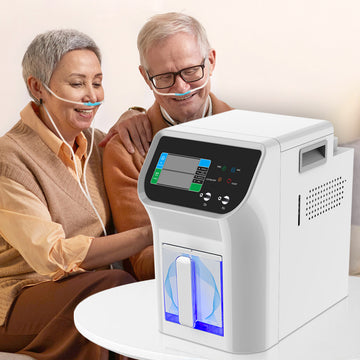Introduction to Molecular Hydrogen
What Is Molecular Hydrogen (H₂)?
Molecular hydrogen, or H₂, is the simplest and most abundant molecule in the universe. It consists of two hydrogen atoms bonded together, forming a colorless, odorless, and tasteless gas. Despite its simplicity, molecular hydrogen plays a fundamental role in the cosmos and has intriguing potential for human health and wellness.
The Fundamental Element of the Universe


The Fundamental Element of the Universe
Most Abundant Element: Hydrogen makes up approximately 75% of the observable universe's elemental mass, making it the most plentiful element.
Stellar Fuel: Stars, including our sun, are primarily composed of hydrogen. Through the process of nuclear fusion, hydrogen atoms combine to form helium, releasing vast amounts of energy that power the stars.
Building Block of Matter: Hydrogen is the foundation from which more complex elements are formed in the cores of stars, a process known as nucleosynthesis.
Presence in Water: Hydrogen combines with oxygen to form water (H₂O), covering about 71% of the Earth's surface and essential for all known forms of life.
Organic Compounds: It is a key component in organic compounds, forming the backbone of carbohydrates, proteins, fats and DNA.
Molecular Hydrogen in the Human Body


Molecular Hydrogen in the Human Body
Abundant Element: Hydrogen is the most abundant element in the human body by atom count, accounting for about 63% of all atoms.
Component of Biomolecules: It is integral to the structure of amino acids, nucleic acids, and lipids, which are the building blocks of proteins, DNA/RNA, and cell membranes, respectively.
Energy Production: Hydrogen atoms play a crucial role in the production of adenosine triphosphate (ATP), the primary energy currency of cells, through cellular respiration.
Gut Microbiota Contribution: Certain bacteria in the digestive system naturally produce molecular hydrogen during the fermentation of undigested carbohydrates.
Physiological Roles: Emerging research suggests that this internally produced hydrogen may have signalling roles or act as an antioxidant within the body.
Unique Properties of Molecular Hydrogen


Unique Properties of Molecular Hydrogen
Molecular Size: As the smallest molecule, H₂ has high diffusibility, allowing it to penetrate cell membranes, tissues, and even the blood-brain barrier.
Bioavailability: Its small size enhances its potential effectiveness in reaching target areas within the body.
Non-Reactive Under Physiological Conditions: Molecular hydrogen is relatively non-reactive, which contributes to its safety profile when used in medical and wellness applications.
Selective Antioxidant Potential: Studies indicate that H₂ may selectively neutralize harmful reactive oxygen species (ROS) like hydroxyl radicals while leaving beneficial ROS intact.
Molecular Hydrogen and Health
Potential Therapeutic Effects
- Antioxidant Properties: By selectively reducing harmful free radicals, molecular hydrogen may help mitigate oxidative stress, which is linked to aging and various diseases.
- Anti-Inflammatory Effects: Hydrogen may modulate inflammatory responses, potentially benefiting conditions associated with chronic inflammation.
- Cell Signaling Modulation: It might influence cell signaling pathways, contributing to protective effects at the cellular level.
Administration Methods
- Hydrogen Inhalation: Breathing in molecular hydrogen gas using specialized inhalation systems allows for rapid delivery to the bloodstream and tissues.
- Hydrogen-Rich Water: Dissolving H₂ gas in water provides a convenient method of consumption with potential health benefits.
- Topical Applications: Hydrogen-infused solutions may be applied to the skin for localized effects.
Research and Safety
- Clinical Studies: Ongoing research is exploring the therapeutic potential of molecular hydrogen in various health conditions, including metabolic, neurological, and cardiovascular disorders.
- Safety Profile: Molecular hydrogen has been shown to be safe at therapeutic concentrations, with no known toxic effects on the body.
Why Hydrogen is Being Studied for Health Benefits
Molecular hydrogen (H₂) has recently garnered attention in the medical community due to its promising health benefits. To break this down for people encountering this information for the first time, it’s helpful to consider some key points about what molecular hydrogen is and why it’s being explored as a therapeutic agent.
Hydrogen gas is not just a potential source of clean energy; it is now being studied for its therapeutic properties. The primary reason it has sparked so much interest is its ability to act as a selective antioxidant. Oxidative stress—damage caused by harmful free radicals—is a significant factor in many chronic diseases, including inflammation, neurodegenerative disorders, and even aging. Antioxidants counteract this damage by neutralizing free radicals. However, not all antioxidants are created equal.
Molecular Hydrogen as a Selective Antioxidant
Molecular hydrogen's most notable feature is its selectivity. It doesn’t neutralize all free radicals in the body—just the most harmful ones, like hydroxyl radicals (•OH), which are among the most damaging reactive oxygen species (ROS). This selective behavior is significant because other antioxidants might neutralize beneficial free radicals, disrupting essential cellular processes. H₂, on the other hand, only targets destructive free radicals, allowing the body’s natural defense mechanisms and beneficial oxidative functions to remain intact.
For people learning about this for the first time, it's important to recognize that oxidative stress underpins many common health conditions. Chronic inflammation, cardiovascular disease, cancer, and neurodegenerative disorders like Alzheimer's are often linked to excessive free radical damage. The idea that molecular hydrogen could help mitigate some of this damage by neutralizing specific free radicals can make it easier to connect the dots to various health concerns.
How Does Molecular Hydrogen Work in the Body?
Because H₂ is the smallest molecule, it can penetrate cellular membranes, including the blood-brain barrier, allowing it to reach areas of the body that many other antioxidants cannot. This is crucial for conditions involving the brain and nervous system, where oxidative stress plays a large role. In fact, studies suggest that H₂ may help reduce brain inflammation, improve cognitive function, and protect against neurodegeneration.
Why Should People Consider Molecular Hydrogen?
For anyone new to this field, it’s worth noting that molecular hydrogen is generally considered very safe. Unlike pharmaceutical antioxidants, which can sometimes cause side effects when they alter too many cellular functions, H₂’s selective nature makes it a low-risk option with broad potential applications. Whether someone is dealing with chronic illness, is interested in anti-aging therapies, or simply wants to optimize their health, hydrogen therapy could represent a natural, non-invasive intervention.
The Growing Body of Research
Multiple studies have explored the benefits of molecular hydrogen in animal models and human trials. Early results are promising, showing potential for H₂ to help manage everything from metabolic syndrome to cognitive decline. While more clinical trials are needed to establish definitive therapeutic protocols, hydrogen’s accessibility—via inhalation, drinking hydrogen-infused water, or even intravenous solutions—has already made it popular in wellness circles.
For those eager to dive deeper into the science of molecular hydrogen, educational platforms like the H₂ Summit are great resources. Researchers from across the globe are sharing their findings on the potential applications of this remarkable molecule.
In conclusion, molecular hydrogen’s ability to selectively target harmful free radicals while leaving beneficial cellular processes untouched makes it a promising avenue for future therapeutic applications. Its safety, ease of use, and growing body of research make it an exciting option for people seeking to address a variety of health concerns—from inflammation to aging to chronic diseases.
Disclaimer: The information provided on this page is for educational purposes only. While research on molecular hydrogen is promising, it is not intended to diagnose, treat, cure, or prevent any disease. Always consult with a qualified healthcare professional before starting any new health regimen.